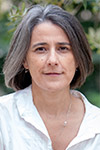Cajun roots surface in poetry written by next ABR author
Martha Serpas said there’s nothing that increases the value of something more than when it’s disappearing.
“The marsh, bayous and wetlands are where I grew up,” said Serpas, who will speak April 6 at the University of Houston-Victoria. “Everything I understand is through that landscape. Now that it’s disappearing so rapidly, it’s all the more precious to me. There’s no possibility of taking it for granted, because chances are my hometown in South Louisiana is not going to be here in 50 years.”
Serpas is the next author visiting Victoria in the spring UHV/American Book Review Reading Series. Her reading will begin at noon in the UHV University West Alcorn Auditorium, 3007 N. Ben Wilson St. It is free and open to the public.
Serpas, a UH English professor, has published three collections of poetry, “Côte Blanche,” “The Dirty Side of the Storm” and “The Diener.” Her work has appeared in The New Yorker, The Nation, Image and Southwest Review, and has been anthologized in the “Library of America’s American Religious Poems” and “The Art of the Sonnet.” She will read poems from “The Dirty Side of the Storm” and “The Diener,” as well as one or two new poems.
The Galliano, La., native said her poetry is primarily rooted in Cajun Louisiana and is concerned with spiritual and ecological matters.
“It’s always a surprise to me when people describe me as a somewhat formal poet because I don’t write poems in form,” Serpas said. “A lot of my poems are written in couplets and a loose system of stresses, so that may be more formal than what free-verse poets are writing today.”
Active in efforts to combat Louisiana’s coastal erosion, Serpas co-produced “Veins in the Gulf,” a documentary about the issue. The 2012 film traces the history of the environmental crisis of southern Louisiana. It tells the story of Louisiana residents confronting the mortality of their culture and the scientists trying to slow the inevitable.
Likewise, “The Dirty Side of the Storm” contains poems that bear witness to the eroding bayou country and its Cajun culture. The dirty side of a storm is the side that receives the most flooding. The counter-clockwise winds push water from the Gulf of Mexico on shore.
“It’s a difficult job to write about the demise of home, but Martha Serpas handles it with great responsibility,” said Jeffrey Di Leo, dean of the UHV School of Arts & Sciences and ABR editor and publisher. “The descriptions of the landscape are fantastic. I’m delighted she will be sharing her work with our students and the community.”
“The Diener” was released by Louisiana State University Press in 2015. The book investigates loss and healing, change and permanence in a hospital trauma center and the eroding landscape. The themes in the collection go well beyond grief and loss, as Serpas finds deeper meaning in faith, humanity and the celebration of life. The characters include a sailor, clerk, mothers, nurses and chaplains.
Serpas went to divinity school at Yale between getting her master’s and doctorate to study religion and literature. While there, many of her classmates were interning as hospital chaplains. She became curious about it, so during her next teaching sabbatical, Serpas started her own clinical pastoral education. At this point, she’s done all the formal training and is amassing hours toward certification.
Serpas’ father passed away suddenly when she was in her early 20s. It was the first time she lost someone close to her.
“Grief, its immediacy and the clarity or realness that it provides has always fascinated me,” she said. “Grief is awful. It’s painful, but at the same time, it makes things much clearer. The emotional clarity and honesty is what I was drawn to.”
Serpas originally thought the idea of providing comfort was the main goal of a chaplain. But the idea is to accompany an individual or family in the present moment.
“Uncertainty is the worst,” Serpas said. “In the hospital, very often families are waiting and full of uncertainty. Someone will say, ‘I know God can save him.’ And in a different family, someone will say, ‘I know he is going to die.’ My job is to listen and tell them we don’t know. All we can do is wait.”
The spring reading series will conclude April 27 with a reading by Duane Niatum. A member of the Jamestown S’Klallam tribe, Niatum has been writing poems, stories and essays for more than 50 years. He is published widely in the U.S. and abroad. He has published eight books of poetry, including “The Pull of the Green Kite.” His writing is connected with the Northwest landscape. The legends and traditions of his ancestors help shape and animate his poetry. He has made a lifelong study of European and American Indian art, literature and culture.
ABR is a nonprofit, internationally distributed literary journal published six times a year. It began in 1977, moved to UHV 10 years ago and has a circulation of about 8,000. The journal specializes in reviews of works published by small presses.
For more information about the UHV/ABR Reading Series, call the ABR office at 361-570-4101 or go to www.americanbookreview.org.
The University of Houston-Victoria, located in the heart of the Coastal Bend region since 1973 in Victoria, Texas, offers courses leading to more than 80 academic programs in the schools of Arts & Sciences; Business Administration; and Education, Health Professions & Human Development. UHV provides face-to-face classes at its Victoria campus, as well as an instructional site in Katy, Texas, and online classes that students can take from anywhere. UHV supports the American Association of State Colleges and Universities Opportunities for All initiative to increase awareness about state colleges and universities and the important role they have in providing a high-quality and accessible education to an increasingly diverse student population, as well as contributing to regional and state economic development.
Jeremy Shapiro
361-570-4350






